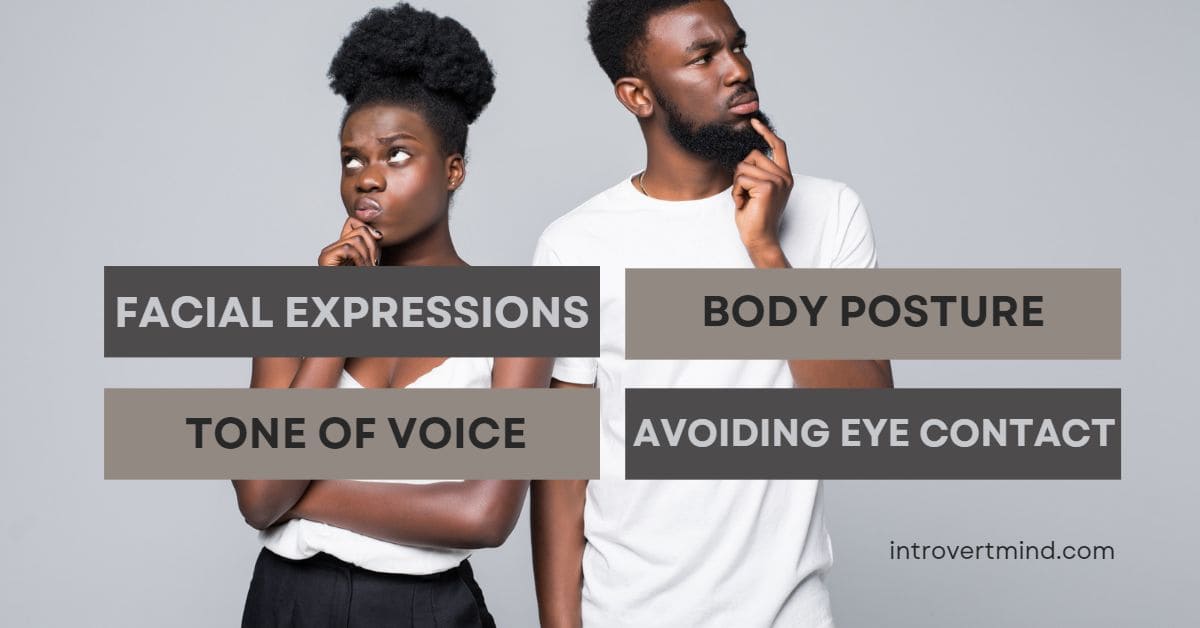Have you ever wondered why some people seem to be better than others at reading body language? Do you find yourself able to pick up on subtle nonverbal cues that others miss, or do you struggle to decipher what someone is really feeling?
Well, it turns out that there may be a scientific explanation for why some people are more skilled at reading body language than others. Recent research has shown that introverts, in particular, tend to be better at reading nonverbal cues than their extroverted counterparts.
In this article, we’ll explore the science behind why introverts are often more adept at reading body language, and provide practical tips for improving your own body language reading skills.
Whether you’re an introvert or an extrovert, this information can help you communicate more effectively and build stronger relationships with those around you.
A Scientific Explanation: Research On Introverts And Body Language Reading Skills

This table provides an overview of some of the key studies that support the idea that introverts are more skilled at reading body language than extroverts.
| Study | Findings |
| “Psychological Science” (2011) | Introverts were better at detecting lies than extroverts due to their tendency towards caution and risk aversion. |
| “Journal of Personality and Social Psychology” (2010) | Introverts were better at decoding nonverbal cues than extroverts, including facial expressions, tone of voice, and body posture. |
| “Journal of Individual Differences” (2015) | Introverts were more sensitive to sensory stimuli than extroverts, allowing them to pick up on subtle changes in body language. |
| “International Journal of Psychology” (2013) | Introverts were more accurate at predicting others’ thoughts and feelings than extroverts, indicating a heightened sense of empathy. |
To understand the science behind why introverts are so skilled at reading body language, researchers have conducted a number of studies over the years.
One study published in the journal “Psychological Science” found that introverts were better at detecting lies than extroverts. The researchers suggested that this might be because introverts are more cautious and less likely to take risks, which makes them more attuned to inconsistencies in people’s behavior.
Another study published in the “Journal of Personality and Social Psychology” found that introverts were better at decoding nonverbal cues than extroverts. This included cues like facial expressions, tone of voice, and body posture. The researchers suggested that introverts were better at decoding these cues because they spent more time observing and analyzing people’s behavior.
Other research has shown that introverts are more sensitive to sensory stimuli than extroverts. This means that they are more likely to pick up on subtle changes in someone’s body language, like a shift in eye contact or a change in tone of voice.
So, what does all of this research mean? Essentially, it suggests that introverts are better at reading body language because of their natural tendencies towards observation, caution, and introspection. This doesn’t mean that extroverts can’t be good at reading body language too – it just suggests that introverts may have a slight advantage in this area.
Improving Your Body Language Reading Skills: Tips For Introverts And Extroverts

Whether you’re an introvert or an extrovert, there are plenty of ways to improve your body language reading skills. Here are some tips to help you get started:
Pay Attention To Nonverbal Cues
This might seem obvious, but the first step to improving your body language reading skills is to start paying closer attention to the people around you. Observe their facial expressions, tone of voice, and body posture to get a sense of how they’re feeling.
Look For Clusters Of Cues
When you’re trying to read someone’s body language, it’s important to look for clusters of cues rather than relying on just one. For example, if someone is crossing their arms, avoiding eye contact, and speaking in a monotone voice, they may be feeling defensive or closed off.
Practice Active Listening
Active listening means fully engaging with the person you’re speaking to and paying attention to their verbal and nonverbal cues. This can help you pick up on subtle changes in their body language and respond appropriately.
Be Aware Of Cultural Differences
Different cultures have different norms when it comes to body language, so it’s important to be aware of these differences when you’re interacting with people from different backgrounds.
Use Your Intuition
Trust your gut instincts when it comes to reading people’s body language. If something doesn’t feel quite right, it probably isn’t.
Practice, Practice, Practice
Like any skill, body language reading takes practice. Try to practice reading body language in a variety of situations, from casual conversations with friends to high-pressure job interviews.
Whether you’re an introvert or an extrovert, these tips can help you improve your body language reading skills and become more attuned to the people around you.
Applying Your Skills: Real-Life Examples Of How Introverts Use Body Language Reading To Succeed

Introverts have a natural advantage when it comes to reading body language, and they can use this skill to their advantage in a variety of real-life situations. Here are some practical examples of how introverts have used their body language reading skills to succeed:
In Job Interviews
An introvert may use their body language reading skills to adjust their posture and tone of voice to match the interviewer’s.
For instance, if the interviewer leans forward and speaks in a serious tone, the introvert may respond by leaning forward and speaking in a similar tone to convey attentiveness and interest.
In Negotiations
During a negotiation, an introvert may use their body language reading skills to pick up on cues that signal agreement or resistance.
For example, they may notice a nod of the head, a smile, or relaxed body posture as signs of agreement, or a furrowed brow, crossed arms, or a tense jaw as signs of resistance.
In Networking Situations
An introvert may use their body language reading skills to identify someone’s interests and mood in a networking situation.
For instance, they may notice someone’s positive body language cues, like open arms, eye contact, and a smile, and start a conversation based on mutual interests.
In Social Situations
In a social setting, an introvert may use their body language reading skills to recognize when someone is uncomfortable or disengaged.
They may notice someone crossing their arms, avoiding eye contact, or looking at their phone, and use this information to adjust their behavior, like changing the topic or offering a break.
In Leadership Roles
An introvert may use their body language reading skills to understand the mood and motivations of their team members. They may notice a team member’s furrowed brow, which may indicate frustration, and offer to help solve a problem. Alternatively, they may observe a team member’s excited demeanor, and offer them a new project to lead.
These practical examples demonstrate how introverts can use their body language reading skills to communicate more effectively and build stronger relationships.
Final Thoughts

In conclusion, the research on introverts and body language reading skills has shed light on the science behind why introverts are often more skilled at picking up on nonverbal cues than extroverts.
Through their natural tendencies towards observation, caution, empathy, and introspection, introverts are able to read body language cues with greater accuracy and sensitivity.
However, this does not mean that extroverts cannot also develop these skills. By paying closer attention to nonverbal cues, practicing active listening, and being aware of cultural differences, anyone can improve their ability to read body language.
Ultimately, body language reading skills are an important part of effective communication and can be used to build stronger relationships, improve negotiation outcomes, and enhance leadership capabilities.
By embracing our natural strengths, whether we are introverts or extroverts, and by continually developing our skills, we can all become better communicators and achieve greater success in our personal and professional lives.

